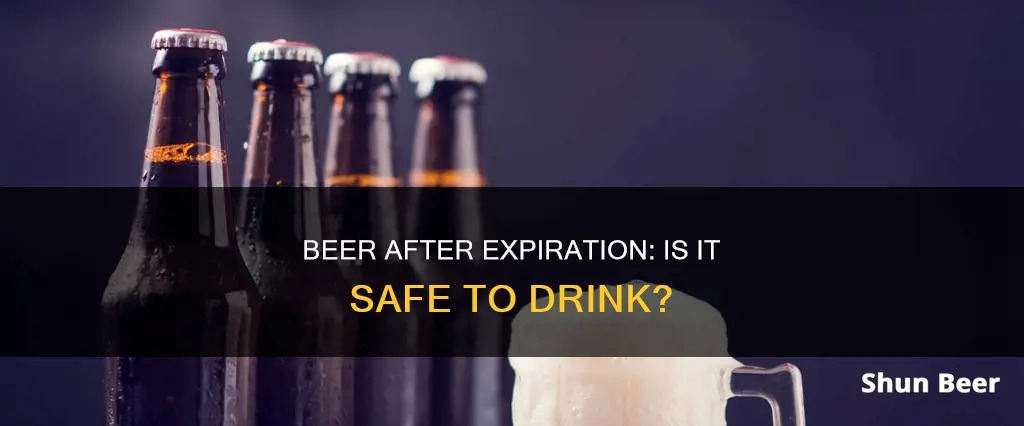
Beer is a beloved beverage for many, but what happens when it passes its expiration date? Can you still drink it? The short answer is yes—drinking beer that has passed its expiration date is unlikely to make you sick. However, the taste and quality of the beer will deteriorate over time. Beer is produced with a best before date, which serves as a guideline for optimal consumption in terms of flavour and freshness. While it is safe to consume beer past this date, you may notice changes in aroma and flavour, with the delightful hoppy notes of an IPA, for instance, dissipating over time.
| Characteristics | Values |
|---|---|
| Is it safe to drink expired beer? | In almost all cases, yes. The fermentation process used in brewing beer, as well as its low pH level and alcohol content, make beer an unfriendly environment for microorganisms. |
| How does beer taste after its expiry date? | Over time, the taste of beer changes and it may develop an unpleasant aroma, taste, or skunky flavour. |
| How long does beer last after its expiry date? | Beer can be okay after two years if properly stored. At room temperature, beer lasts about 5 to 9 months beyond its expiry date. In a refrigerator, unopened beer can last up to two or three years, while opened beer has a shelf life of about a day. |
| How to store beer to maximise its shelf life? | Store beer in a cool, dark place, away from temperature fluctuations. Keep it upright to minimise oxidation and avoid exposing it to direct sunlight. |
| How to identify expired beer? | You can tell if beer has gone bad from the colour, smell, taste, foam density, and overall appearance of the beer. If the beer has lost its fizz, it's a sign that the seal was broken. |
What You'll Learn

Beer expiration dates are about quality, not safety
Beer expiration dates are more about quality than safety. While beers do come with expiry dates, they are more of a guideline on quality than safety. This means that the beer will start to lose its quality after the stated date, but it can still be consumed. It just might not taste as good. Beer lovers can attest that beer is best enjoyed cold and fresh.
The fermentation process used in brewing beer, as well as its low pH level and alcohol content, make beer an unfriendly environment for microorganisms. Even if a beer sits on the shelf for years, as long as it’s sealed, it’s unlikely to make you sick. The alcohol content in beer and the presence of hops, which have antimicrobial characteristics, prevent pathogenic bacterial growth. The worst thing that will happen to beer when it gets old is that it will taste bad.
However, there are a few situations where you will have to discard an old beer. For instance, if your beer has lost its fizz, this is a sign that the seal was broken at some point, and the flavour will be compromised. Also, if a beer develops a vinegary taste, it is an indication that bacteria has gotten into the beer, and it should be thrown out.
Additionally, the type of beer affects its shelf life. Stronger beers, such as stouts, porters, and high-alcohol content beers, tend to last longer than lighter beers like lagers and pilsners. Beers with higher ABV contents have greater longevity. On the other hand, hoppy beers, like IPAs, are best consumed fresh to enjoy their full flavour and aroma.
To maintain the freshness of your beer, it is recommended to store it in a cool, dark place, preferably a refrigerator. If you’re storing beer at room temperature, ensure that it is not exposed to direct sunlight. Keeping beers upright also helps minimise oxidation.
High Blood Pressure and Beer: What's the Verdict?
You may want to see also

Beer won't make you sick, but it might taste bad
Beer is unlikely to make you sick past its expiration date, but it might not taste very nice. The fermentation process used in brewing, as well as its low pH level and alcohol content, make beer an unfriendly environment for microorganisms. However, the taste of beer changes over time, and it can become stale or flat.
The shelf life of beer varies depending on the type and how it is stored. Beer stored in a refrigerator can last up to two or three years unopened, and one day once opened. Beer kept at room temperature will last about 5 to 9 months beyond the expiration date listed on the label. Beer should be stored in a cool, dark place, and it is best to drink it as fresh as possible.
You can tell if a beer has gone bad by its smell, taste, and appearance. If it smells or tastes like vinegar, it has likely been contaminated by bacteria and should be thrown out. Other signs of a bad beer include a lack of fizz, a bad aroma, and excessive sediment at the bottom of the bottle.
To keep beer fresh for as long as possible, store it in a cool, dark place, away from temperature fluctuations, and keep it upright to minimize oxidation.
Beer and Zarelto: Safe or Not?
You may want to see also

Beer should be stored in a cool, dark place
Additionally, light exposure, especially UV rays, can cause beer to develop a skunky odour and taste. This is more common in beers packaged in clear or green bottles, as brown bottles offer better protection, and cans completely block out light. So, it's best to keep beer out of direct sunlight and store it in a cool, dark place.
If you're looking to store beer for a longer period of time, a basement or cellar is ideal. Beer can last for years in a cold, dark place. This is especially true for richer and higher ABV varieties of beer, such as porters and stouts, which can improve with age.
Drinking Beer and Driving in the UK: What's Allowed?
You may want to see also

Beer can be used for cooking
Firstly, beer is a great braising liquid. It adds depth to everything from carrots to short ribs, and it's perfect for fish tacos. Beer can also be used as a marinade, as seen in Brazilian Beer-Marinated Chicken. It's also a great liquid base for stews and chilis.
Beer is also a fantastic ingredient for batters. Beer batter imparts an amazing crunch to fried foods like cheese curds, onion rings, and fish. It can even be used in sweet applications, such as Guinness ice cream.
In baking, beer can be used as a leavening agent, as it contains yeast. The carbonation in beer can also make baked goods light and fluffy. For example, beer bread or pizza dough can be made using beer.
Additionally, beer can be used as a tenderiser. A beer brine can add flavour to meats, and the alpha acids and tannins help to break down the fibres in the meat, making it more tender and juicy.
When cooking with beer, it's important to consider the flavour of the beer and how it will complement the dish. For instance, a bitter, hoppy beer might not be the best choice for a chili, as its strong flavour could make the dish bitter. Instead, a pilsner or amber beer would be a better option.
So, the next time you have a bottle of beer that's past its expiration date, don't throw it away! Try using it in your cooking instead. Just remember to match the flavours of the beer to the other ingredients in your dish, and don't be afraid to experiment.
Beer and Joseph Smith: A Regular Occurrence?
You may want to see also

Different types of beer have different shelf lives
Beer does expire, but it doesn't pose the same health risks as spoiled food. The worst thing that will happen if you drink expired beer is that it will taste bad. However, different types of beer have different shelf lives.
Lighter beers, such as pale ales, wheat beers, and lagers, tend to have a shorter shelf life and should be consumed within three months of their packaging date. This is because they are usually lower in alcohol content, which acts as a preservative. India Pale Ales (IPAs) fall into this category, although their alcohol content tends to be higher. IPAs can last up to 12 months but may start to lose quality after a few months. Wheat beers and brown ales are similar, with a shelf life of around four months.
On the other hand, heavier beers like stouts and porters have a longer shelf life of about six months. These beers can be enjoyed at their peak flavor within 180 days of packaging.
Barrel-aged beers, including sour ales and imperial beers, also have a longer shelf life due to their higher alcohol content. The souring agent in these beers continues to work for several years, so their taste can evolve long after packaging. Oxidation benefits these beers, as small amounts of air interact with the beer over time, creating desirable chemical reactions.
Some beers, like barley wines and imperial stouts, are brewed with aging in mind. These beers are often high in alcohol and malt-forward, and brewers intend for them to be aged for a couple of years. As a result, they are an exception to the general recommendation to drink beer as fresh as possible.
It's important to note that proper storage plays a crucial role in maintaining the quality and shelf life of beer. Beer should be stored in a cool, dark place, away from direct sunlight, to prevent spoilage and ensure the best taste.
Beer and Flying: What's the Safe Limit?
You may want to see also
Frequently asked questions
Drinking beer after its expiration date is generally considered safe, but it may not taste very good. The worst thing that will happen is that the beer will have an unpleasant taste or aroma.
Beer can last 5 to 9 months past its expiration date at room temperature. In a refrigerator, beer can last up to 2 to 3 years.
Beer expires due to the natural growth of bacteria and chemical reactions over time. The alcohol content in beer prevents pathogenic growth, so it is unlikely to make you sick.
Check for signs such as a lack of carbonation, a bad aroma, or a change in colour or taste.







